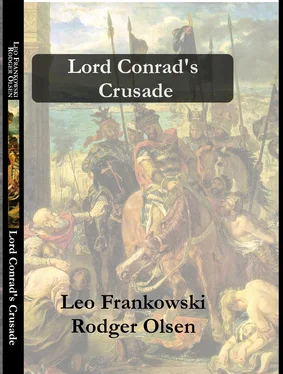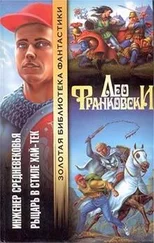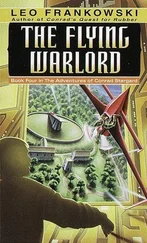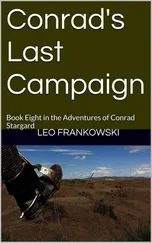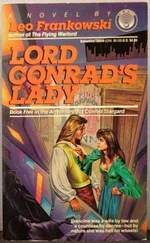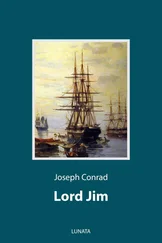Лео Франковски - Lord Conrad's Crusade
Здесь есть возможность читать онлайн «Лео Франковски - Lord Conrad's Crusade» весь текст электронной книги совершенно бесплатно (целиком полную версию без сокращений). В некоторых случаях можно слушать аудио, скачать через торрент в формате fb2 и присутствует краткое содержание. Год выпуска: 2014, Издательство: Great Authors Online, Жанр: Альтернативная история, на английском языке. Описание произведения, (предисловие) а так же отзывы посетителей доступны на портале библиотеки ЛибКат.
- Название:Lord Conrad's Crusade
- Автор:
- Издательство:Great Authors Online
- Жанр:
- Год:2014
- ISBN:нет данных
- Рейтинг книги:3 / 5. Голосов: 1
-
Избранное:Добавить в избранное
- Отзывы:
-
Ваша оценка:
- 60
- 1
- 2
- 3
- 4
- 5
Lord Conrad's Crusade: краткое содержание, описание и аннотация
Предлагаем к чтению аннотацию, описание, краткое содержание или предисловие (зависит от того, что написал сам автор книги «Lord Conrad's Crusade»). Если вы не нашли необходимую информацию о книге — напишите в комментариях, мы постараемся отыскать её.
Lord Conrad's Crusade — читать онлайн бесплатно полную книгу (весь текст) целиком
Ниже представлен текст книги, разбитый по страницам. Система сохранения места последней прочитанной страницы, позволяет с удобством читать онлайн бесплатно книгу «Lord Conrad's Crusade», без необходимости каждый раз заново искать на чём Вы остановились. Поставьте закладку, и сможете в любой момент перейти на страницу, на которой закончили чтение.
Интервал:
Закладка:
“Thank you, my lord. On another matter, I was very pleased to meet your Big Person, Silver. Being at sea most of the time, I have had regrettably little contact with these people. But from what I have read, they have some remarkable abilities. Their eyesight and hearing are claimed to be far superior to those of us ordinary humans, and it is said that their sense of direction is remarkably good. These abilities would be very helpful when trying to navigate a ship in bad weather! What can you tell me about this?”
“Well, basically, everything that you have said is true. I suppose that we could try her out as an assistant helmsman, but there will be difficulties. Most of the Big People understand Polish, but Silver understands only English, and not the dialect spoken there today. In any test, I would have to translate for her.
“There might be a better way,” I continued. “Cynthia here is from the same place that Silver came from. She has many of the same abilities that Silver has, and she can both understand and speak Polish. We might want to test her out as a helmsman and a navigator.”
“This charming young lady is from the same place that the Big People are from? Astounding! And where might that place be?”
“I really don’t know. Perhaps the right question might be ‘When was that place?’, since as best as I can understand it, a very long time ago, there was a fabulously advanced culture. The people there knew so much about God’s plan that they were able to imitate some parts of it. They could actually create life! The Big People and this fine lady’s people were created by them.”
“And what happened to these wizards?”
“I’m not sure that anything happened to them, for they also mastered the arts of time and space, and learned to travel from one era to another. Perhaps I should not be telling you about this, but you seem to be an honorable man, and it has been building up in me for a long time.”
“Such a tale would weigh on me as well, my lord. You may be assured of my discretion. But as to testing the abilities of your lady, and not those of Silver, could we start in the morning? I can see that Cynthia would be far more convenient to have on shipboard than your mount, who is overly large and couldn’t climb up to the crow’s nest.”
I asked Cynthia if she wanted to do it, and she was agreeable. We would start after breakfast.
It was another beautiful day, but in good conditions, Cynthia could see better with her naked eyes than any of the rest of us could with a telescope. Her hearing was outstanding as well, and she seemed to have a perfect sense of direction, too. Even on the deck of a moving ship, blindfolded, and spun many times around, she could always point to true north! We were all amazed. We also tested three members of the crew in the same fashion, and none of them could begin to compare with her performance.
Soon, she was given a short course in map reading and simple navigation, and she seemed to have an eidetic memory. Once she saw a chart, and studied it for a bit, she never had to look at it again.
On the other hand, she had absolutely no ability at all in mathematics, beyond very simple arithmetic. She would never be a good navigator.
By noon, they had her steering the ship, under the watchful eye of the usual helmsman.
“Now all we have to do is hope for some foul weather, so we can see how she does there,” the captain said.
“That’s a strange thing for a sailor to wish for,” I said.
“Isn’t it though! But I’m not likely to get an opportunity like this again, and I want to make the best of it!”
But the weather stayed fine, and I got to watch the running of the ship.
The Explorer class were container ships. They hauled standard army containers which were the same size as our old war carts, and our railroad cargo cars, far smaller than the containers used on modern ships. They were six yards long, two yards wide, and a yard and a half high.
Because our ships had to be able to pick up cargo and deliver it at unscheduled destinations, they had to be able to get to any container on the ship without unloading everything above it. This was accomplished by dividing the hold into nine sections, long tunnels, each over six yards wide and over three yards high, and running two-thirds of the length of the ship. Each tunnel was normally sealed, to act as a water tight floatation device.
Each container had a ‘half nut’ under each corner, which rode on a long screw running the length of the tunnel. Each tunnel had four of these screws, with two layers of containers, permitting each tunnel to be used for other things, like hauling cattle or even people, in an emergency, if the containers were removed.
At the aft end of the tunnels, a system of elevators and a lateral transfer system let containers be transferred from one tunnel to another, so that cargo could be shifted at will.
It was not an inexpensive or extremely efficient system, but it was a very flexible system, which also permitted the balance of the ship to be easily adjusted.
Two steam launches and several dozen towed barges (which doubled as lifeboats) were normally stored on board. The elevator, the lateral transfer system, and some davits permitted the launches and barges to be easily loaded and unloaded.
A lance of men seemed to be at work constantly, opening containers, sorting their contents to other containers that would go to particular destinations, sealing the containers back up, and sending them below to the tunnels.
We charged less for large shipments to a single destination. And we charged more for anything in a non-standard package.
A few more people were sorting mail in the same way.
The system worked well, and the fast lighters quickly picked up and delivered cargo and passengers.
The ship had five dozen small passenger cabins, which were usually underutilized. I had expected passenger travel to be greater than it was. The ship’s crew and their families often used the extra rooms with the understanding that if paying passengers needed them, they had to vacate to their old, and somewhat cramped, quarters in the forecastle.
A cafeteria and a social hall were available for both the crew and passengers. They were clean and functional but not very attractive. Typical Army stuff.
The ship was painted red and white, carried a white Polish eagle on its red smokestack, and I thought that it was beautiful.
The aft quarter was the business end of the ship. She used two triple expansion V-6 piston engines, each with its own screw, which were fed by two separate tubular boilers. They usually burned coal, but in a pinch they could burn oil, wood, or anything else available. The Explorer class ships were designed to survive, even if they were stranded off the coast of Africa!
These boilers were fed distilled water by a system of condensers and evaporators which used waste engine heat to evaporate sea water, and condense it in compartments along the bottom of the hull. This fresh water was also used by the crew. The sea salt that resulted as a byproduct turned out to be very salable, and was a source of additional revenue.
The steam used by the engines was also condensed, of course, and reused.
Besides a compass, two radios, a sonic depth gage, and a forward looking sonar rig, the bridge was equipped with one of our first radar rigs. “Wonderful things,” the captain said, “Providing that you can keep them all working. Electronic devices have a habit of going west just when you need them the most.”
“Yes, well, we are working on reliability. It takes time,” I said.
The ship was lightly armed, enough to repel boarders, with six steam-powered pea shooters and a like number of swivel guns, but it was never intended to be a real war ship. The army had never built a war ship. Who would such a ship fight? What we already had was superior to anything else on the sea. Our ferrocrete hulls could shrug off anything that a traditional, Thirteenth Century ship could throw at us, our upper decks were five yards higher than those of the tallest wooden ship, so boarding was nearly impossible, and being faster and not at the mercy of the wind, we could always ram them. This made everyone around very friendly and peaceful.
Читать дальшеИнтервал:
Закладка:
Похожие книги на «Lord Conrad's Crusade»
Представляем Вашему вниманию похожие книги на «Lord Conrad's Crusade» списком для выбора. Мы отобрали схожую по названию и смыслу литературу в надежде предоставить читателям больше вариантов отыскать новые, интересные, ещё непрочитанные произведения.
Обсуждение, отзывы о книге «Lord Conrad's Crusade» и просто собственные мнения читателей. Оставьте ваши комментарии, напишите, что Вы думаете о произведении, его смысле или главных героях. Укажите что конкретно понравилось, а что нет, и почему Вы так считаете.
